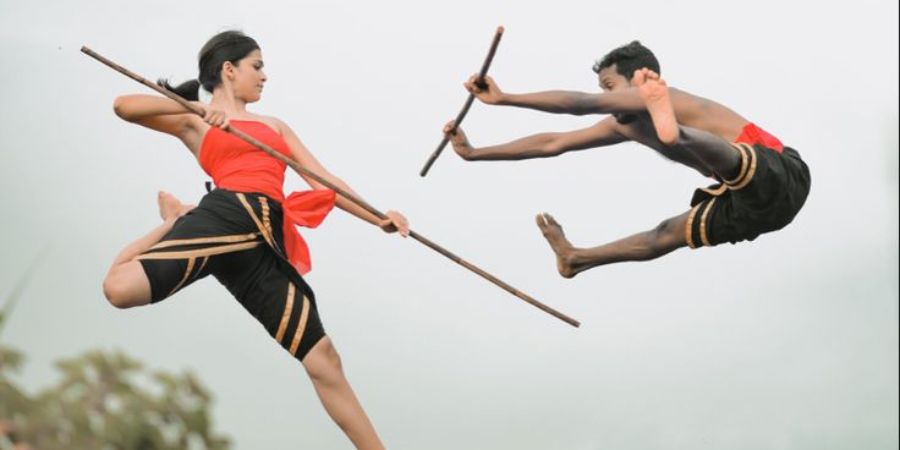

Kalaripayattu is a traditional Indian martial art form that originated in the state of Kerala. It is believed to be one of the oldest fighting systems in existence, with a history spanning over thousands of years. The name "Kalaripayattu" is derived from the Malayalam words "Kalari," which means battlefield or combat arena, and "Payattu," which means practice or fight. The art form combines physical techniques, weaponry, and self-defense strategies, along with a deep focus on mental and spiritual development.
Kalaripayattu encompasses a wide range of techniques, including strikes, kicks, grappling, throws, locks, and evasive movements. These techniques are performed with fluidity, grace, and precision, requiring strength, flexibility, and agility. The training regimen in Kalaripayattu is rigorous, emphasizing discipline, concentration, and physical fitness. Practitioners undergo intense physical conditioning exercises, including stretching, bodyweight exercises, and various forms of cardiovascular training.
One of the distinguishing features of Kalaripayattu is its incorporation of various weapons. These weapons include the long staff (known as the "ottakol"), curved sword (known as the "urumi"), flexible sword (known as the "chuttuval"), dagger (known as the "kuntham"), and spear (known as the "velakanni"). Each weapon has its own unique techniques and forms, and practitioners must master their use through dedicated training.
In addition to physical techniques, Kalaripayattu places great importance on mental and spiritual aspects. It encompasses a holistic approach to training, integrating physical movements with breathing exercises, meditation, and yoga postures. The mental training in Kalaripayattu aims to cultivate focus, discipline, and self-awareness, enabling practitioners to remain calm and composed in combat situations. Furthermore, the spiritual dimension of Kalaripayattu seeks to connect practitioners with their inner selves, promoting a sense of harmony and balance.
The training in Kalaripayattu takes place in specialized training centers called "kalari," which are usually made of clay and covered with a roof made of thatched coconut leaves. The kalari serves as a sacred space for learning and practicing the art form. The training is traditionally passed down from a master, known as a "Gurukkal," to the disciples. The Gurukkal acts as a guide and mentor, imparting not only the physical techniques but also the philosophical and cultural aspects of Kalaripayattu.
Kalaripayattu is not just a martial art but also a cultural heritage of Kerala. It is deeply rooted in the history and mythology of the region, with references to its techniques found in ancient texts and epics. The art form has influenced various other martial arts styles, both within India and abroad.
In recent years, Kalaripayattu has gained recognition as a valuable form of physical exercise, self-defense, and cultural expression. It has attracted practitioners from around the world who are drawn to its rich tradition, dynamic movements, and holistic approach to personal development. Kalaripayattu performances and demonstrations are also popular among tourists, showcasing the art form's vibrant techniques and captivating choreography.
Thank you……….
Please like and follow me……..
